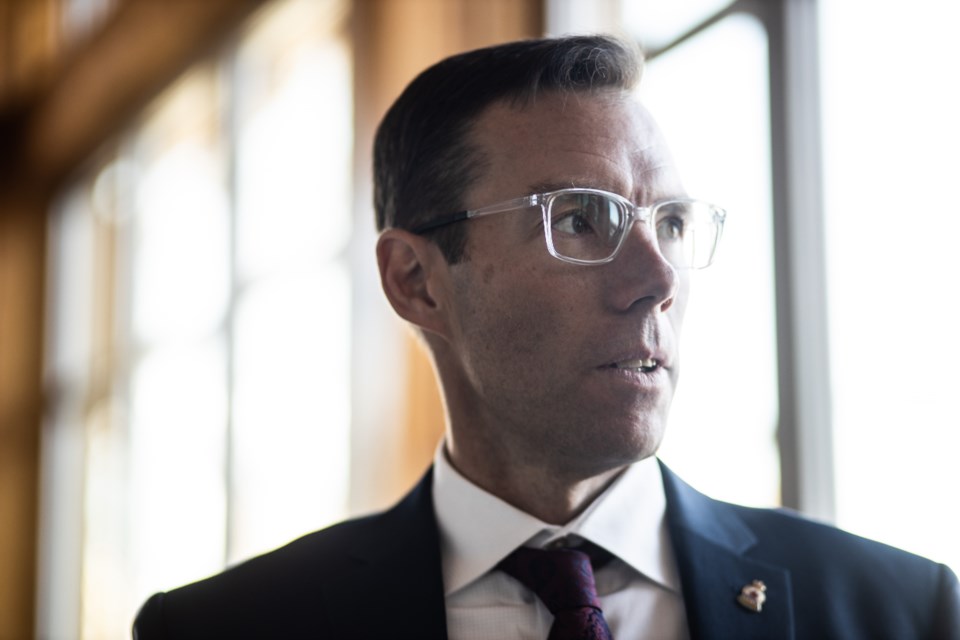Mental health is at the forefront of a new working group co-chaired by Foothills MP John Barlow.
Barlow, with fellow Conservative MP Todd Doherty from northern B.C., is spearheading an Opioid Crisis Working Group focused on addressing levels of drug overdose and mental health decline across Canada.
Both issues have exceeded the crisis level due to stress and unemployment since March 2020, said Barlow.
“We’ve known that this is a pretty serious issue, but it’s been exacerbated by COVID and the pandemic,” he said.
A recent study conducted by the Canadian Mental Health Association (CMHA) revealed how the scales had tipped, he said. The study showed about 40 per cent of Canadians said their mental health had deteriorated since last March, 10 per cent said they have had suicidal thoughts since the onset of the pandemic and 17 per cent admitted to increasing substance use as a coping mechanism.
According to statistics gathered by the Province, overdose and suicide deaths tripled in Alberta from January to July as well, he said.
“It’s something we couldn’t ignore,” said Barlow. “Obviously the impact of the COVID pandemic on the mental health of all Canadians, and certainly my constituents, is profound and I think it’s going to be long-lasting.
“As elected officials and community leaders we have to step up and find a tangible solution to what I think now far exceeds a crisis.”
The work began in December, when Doherty put forward a motion unanimously passed in the House of Commons to establish a 988 suicide hotline in Canada. A similar line exists in the United States already, said Barlow.
It would be beneficial for Canadians struggling with mental health and suicidal thoughts, he said. Currently, the hotline available in Canada is an answering service asking callers to leave a message.
“In a time of crisis that’s not really what we need,” said Barlow. “We want fewer obstacles.”
He said some mental health professionals have already raised their hands to say they would volunteer their time to answer phones, ensuring people calling in a time of need are able to speak to someone who can listen and provide professional assistance immediately.
There is no timeline yet on establishing the hotline, but Barlow said he hopes to hear an update after the House returns Jan. 25.
The working group, however, has hit the ground running.
About 20 Conservative MPs have joined in the cause, and each member is working with stakeholder groups and contacts in their own regions to learn about resources that may be available, programs that are working, or gaps that may exist in the system.
“We’re going to collect all these things and try to come up with a policy, ides that we can have as part of our election platform and hopefully try to make some changes,” said Barlow, adding he has spent most days on Zoom calls with various professionals from around the Foothills riding and the CMHA.
Part of the work being done is also at the provincial level, speaking with ministers across the country, he said, since mental health falls under provincial jurisdiction.
There are now ministers of mental health and addiction in B.C., Alberta and Saskatchewan, which Barlow said helps to bridge some gaps.
“It’s something we’ve never seen before, and it gives us a really good conduit to some of the provinces and what they’re doing,” he said.
The research doesn’t stop at Canada’s borders, he said. There are numerous programs that have seen success in the States, and he said they’re looking into those as well.
“This isn’t necessarily about reinventing the wheel,” said Barlow. “Maybe there are some templates and some programs we can emulate that have been used and proven to be successful in other areas.”
While he would like to see the research come together as soon as possible, Barlow said there is no expiration date on the working group.
It will take a lot of time and fine-tuning to turn the ideas and information gathered in the coming weeks and months into plans and policies that can be implemented, he said.
Mental health and suicide is only one side of the coin, he said. Addressing the opioid crisis and handling drug trafficking and dealing to curb addiction is the other.
Part of the equation will be taking dealers and traffickers off the streets and ensuring they stay in the criminal justice system, he said.
It will also involve providing tangible paths to recovery for addicts.
“With this current system right now, where we’ve sort of relied on supervised injection sites, that just seems to be a perpetuating cycle and doesn’t actually get people into recovery,” said Barlow.
It’s all going to take a lot of work, but he said the group is committed to seeing it through and having viable recommendations and policies to implement in the end.
Barlow said he’s passionate about finding solutions, especially since he’s seen the impacts of mental health decline in his riding.
“There’s not too many people I know who have not had a loved one or a relative or friend or neighbour that have experienced, whether it’s an opioid or fentanyl overdose, or through COVID having mental health issues and depression,” he said. “So I think this is something that touches all of us and something we see as maybe besides COVID the public health issue of our generation that we need to try to resolve.”
If you need help call: Canada Suicide Prevention Service: Phone 1-833-456-4566 or Text 45645 (Text, 4 p.m. to midnight ET only) crisisservicescanada.ca
Kids Help Phone: 1-800-668-6868, Live Chat counselling at www.kidshelpphone.ca
If you are worried someone you know may be at risk of suicide please talk to them and watch for these warning signs: suicidal thoughts, substance abuse, purposelessness, anxiety, withdrawal, anger, recklessness and mood changes.




